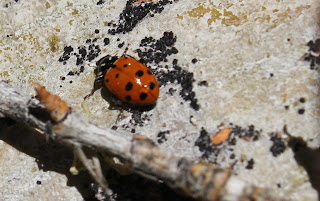We are at the
time of the season when insects are out and doing more damage than
you can handle. I don’t mind sharing, but when the entire leaf looks like a skeleton
or seedling are eaten to the ground it is time to act. Since there are several insects
that I would like to cover it might be easier to take one at a time,
today it is aphids.
There are hundreds of
different aphid species, and most attack specific kinds of herbaceous or woody
plants, your perennials, shrubs and trees.
Aphid damage can cause stunted
growth, leaf curling, distortion and yellowing. The sticky honeydew that aphids
produce promotes the growth of sooty mold, a black fungus that forms on plants
and nearby surfaces. They can also spread viral diseases between plants.
Controlling aphids is easier when numbers are smaller, so prevention is important. Remember that stressed plants have a smell that attack pests, healthier plants are less susceptible. However, don’t over fertilize your plants, overfeeding with high nitrogen products will cause lots of lush growth that aphids love. Spraying the plant with a jet of water, or insecticidal soap bi-weekly is an easy and safe way to control aphids. I like the Bayer Tree and Shrub drench that only has to be applied once a year for systemic treatment. Prune infested limbs off and dispose of them, don’t put them in the compost pile.
Controlling aphids is easier when numbers are smaller, so prevention is important. Remember that stressed plants have a smell that attack pests, healthier plants are less susceptible. However, don’t over fertilize your plants, overfeeding with high nitrogen products will cause lots of lush growth that aphids love. Spraying the plant with a jet of water, or insecticidal soap bi-weekly is an easy and safe way to control aphids. I like the Bayer Tree and Shrub drench that only has to be applied once a year for systemic treatment. Prune infested limbs off and dispose of them, don’t put them in the compost pile.
Aphid’s can also be controlled by using parasitic wasps, lacewings and
ladybugs.


No comments:
Post a Comment